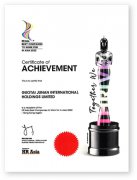2.9 million awarded to 17 projects in Reproductive Medicine and Maternal Health in nine countries
Programme reinforces Ferring’s #ProjectFamily Commitment to support everyone’s right to build a family
Many inequalities and disparities in reproductive medicine and maternal health currently go unaddressed, due to a lack of dedicated research and investment
SAINT-PREX, Switzerland -- (BUSINESS WIRE) --
Forensic analysis of stone age human fertility to better understand why modern-day sperm counts are falling, and a project to support safe birth in rural Ethiopia by providing trained midwives and solar power kits, are among 17 winners of a new Ferring Pharmaceuticals grant programme unveiled today.
The wide-ranging programme is designed to tackle inequalities and disparities in reproductive medicine and maternal health, reinforcing Ferring’s ambitious #ProjectFamily Commitment, which supports everyone’s right to build families of every shape and size.
Through collaboration with people across the globe, Ferring has outlined how it will develop programs, services, and treatments to address unmet needs in reproductive medicine and maternal health. Millions of people around the world are unable to access the care, treatment and support they need to build a family, and so, the grants aim to support projects that focus on delivering better outcomes and solutions at every stage of the reproductive journey, from conception to birth.
“At Ferring, we believe in everyone’s right to a family. That is why we are determined to play our part in collaborating to tackle some of the unique challenges faced by people across the globe when building families,” said Per Falk, President of Ferring Pharmaceuticals. “The projects funded by the grant programme aim to address some of the greatest global gender, health and racial inequalities in reproductive medicine and we look forward to realising positive outcomes of these projects.”
Today’s announcement totals funding of nearly €2.9 million to support 17 projects in nine countries, including Australia, Brazil, Canada, Denmark, Ethiopia, South Sudan, Uganda, the United Kingdom and the United States. It includes the 12 inaugural winners of the Racial Equality Grants in Reproductive Medicine and Maternal Health, a dedicated research programme to deepen understanding and drive solutions to tackle racial disparities in reproductive medicine and maternal health. The programme comprehensively addresses the scope of this issue by funding innovative research proposals in epidemiology as well as basic, clinical, translational, and social sciences.
The programme builds on the success of #ProjectFamily: Safe Birth initiative, a decade-long public-private partnership, which earlier this year introduced a heat-stable formulation to prevent excessive bleeding after childbirth, known as postpartum haemorrhage (PPH). By seeking to prevent PPH, Ferring will support efforts to protect the lives of 20 million women and their families by 2030.
How the grants programme aligns to the Ferring #ProjectFamily Commitment:
#1 Learning from patients to improve their treatment and care
Key fact: Cancer treatments can reduce the chances of having a family, so fertility preservation interventions need to happen before treatment starts.1 Decisions regarding the potential risk to fertility therefore need to be made with extreme time pressure when the person is also dealing with the new cancer diagnosis. A recent UK survey highlighted problems in accessing fertility preservation for young cancer patients.2
Research grant: University of Edinburgh Development Trust and University Court of the University of Edinburgh and its research project, ‘Supporting Fertility Preservation Treatment Decision-Making’. This project will develop fertility preservation patient decision making aids to support cancer patients across Europe. This study will build on an existing web-based decision aid created by the research team and will create new tailored resources for different patient groups in a range of languages.
#2 Collaborating to reduce maternal and infant mortality
Key fact: In rural Ethiopia, unreliable or non-existent power supplies mean that women delivering at night may give birth in the dark, preventing midwives being able to detect or manage complications. Training midwives and providing safer birthing conditions by supplying light and reliable power is critical to addressing this.
Support grant: Ferring is supporting GreenLamp, an organisation dedicated to improving conditions for mothers and babies in rural Ethiopia and its ‘Ethiopian Maternal Health Community Programme’ through a 5-year holistic model, which will lead to high impact and sustainable improvements in a region of rural Ethiopia with extreme unmet needs.
Key fact: Every year, 70,000 women die from PPH,3 with the majority of deaths occurring in low- and lower-middle income countries.4 The majority of PPH deaths could be avoided through preventative approaches, however, this is not always the reality for those living in humanitarian crisis settings, for example conflict regions, natural disasters and public health emergencies.
Research grant: The United Nations Population Fund (UNFPA) is collaborating with Ferring Pharmaceuticals to contribute to the body of evidence regarding the safe introduction of additional resources such as heat-stable carbetocin for the prevention of PPH in low resource humanitarian contexts such as Uganda and South Sudan. Through this, both organisations aim to contribute to providing access to safe birth in the most vulnerable settings.
#3 Closing gender and racial inequality gaps in reproductive medicine and maternal health
Key fact: Around the world, including in high income countries, black women and women of colour are more likely to die from complications during pregnancy and childbirth than white women. Startling racial disparities also exist in fertility treatment. Studies in the US suggest that black women may be twice as likely as white women to have fertility problems but are far less likely to seek or receive treatment that could help them to build their families.5 Furthermore, in the UK, minority ethnic groups undergoing fertility treatment are less likely to have a baby, with black couples having the lowest chance of successful treatment.6
Research grant: The Ferring Innovation Grants Programme for Racial Equality in Reproductive Medicine and Maternal Health, a dedicated research programme to deepen understanding and, ultimately, drive solutions to tackle racial disparities in reproductive medicine and maternal health, including maternal mortality, in-vitro fertilisation (IVF), pregnancy and postpartum outcomes.
#4 Working together to win hearts and minds
Key fact: The fertility rate - the average number of children a woman gives birth to - is falling. If the number falls below approximately 2.1, then the size of the population starts to decrease. In 1950, women were having an average of 4.7 children in their lifetime. Research showed the global fertility rate nearly halved to 2.4 in 2017 - and projections indicate it will fall below 1.7 by 2100.7 In line with this, the number of babies born globally as a result of IVF increased from under one million in 2007, to over two million in 2012.8
Research grant: International Federation of Fertility Societies (IFFS) and its research project, ‘Global decreasing fecundity trends: Society changes and implications, fertility awareness and access to infertility care’.
Research grant: Globe institute at the University of Copenhagen and Copenhagen University Hospital – Rigshospitalet research project, ‘Understanding the reproduction paradigm of humankind in the Anthropocene (‘Ancient Reproduction’)’ which aims to map the evolutionary history of reproductive dysfunction by evaluating changes in environmental pollution and associated biological responses over time.
ENDS
About the Ferring Innovation Grants Programme for Racial Equality in Reproductive Medicine and Maternal Health
The Ferring Innovation Grants Programme for Racial Equality in Reproductive Medicine and Maternal Health (RMMH) aims to fund projects to deepen understanding and, ultimately, drive solutions to tackle racial disparities in RMMH, including maternal mortality, in-vitro fertilisation (IVF), pregnancy and postpartum outcomes.
The Ferring Innovation Grants Programme for Racial Equality in RMMH provides research grants of up to €20,000 and aims to fund multidisciplinary research projects across four main areas: basic and translational; clinical; epidemiology and prevention; and social science research. The winners for 2021 included Monash University (Australia), Universidade Federal de Minas Gerais (Brazil), McMaster University (Canada), University of Copenhagen (Denmark), Boston IVF Fertility Clinic (USA), Boston University (USA), Foundation for Research and Education Excellence (USA), Johns Hopkins University (USA), Rejuvenating Fertility Center (USA) and Yale School of Medicine (USA).
About Ferring Pharmaceuticals
Ferring Pharmaceuticals is a research-driven, speciality biopharmaceutical group committed to helping people around the world build families and live better lives. Headquartered in Saint-Prex, Switzerland, Ferring is a leader in reproductive medicine and maternal health, and in specialty areas within gastroenterology and urology. Ferring has been developing treatments for mothers and babies for over 50 years and has a portfolio covering treatments from conception to birth. Founded in 1950, privately-owned Ferring now employs approximately 6,000 people worldwide, has its own operating subsidiaries in more than 50 countries and markets its products in 110 countries.
Learn more at www.ferring.com, or connect with us on Twitter, Facebook, Instagram, LinkedIn and YouTube.
# # #







